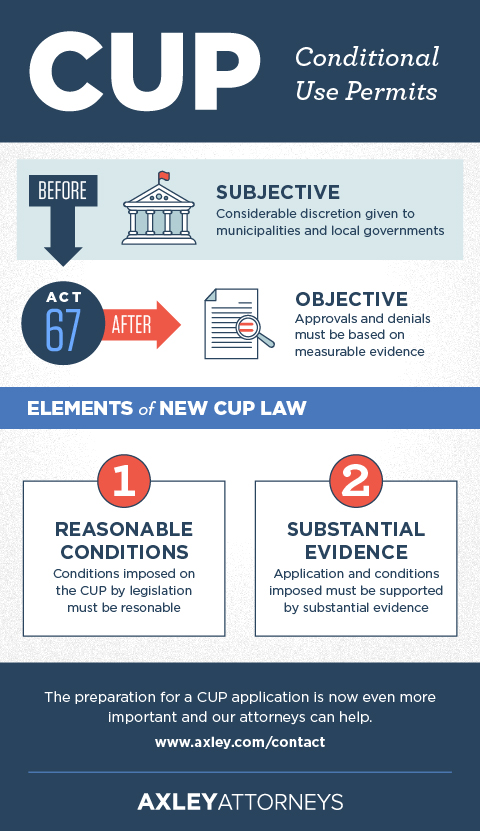(C)UP, (C)UP, and Away? Where Will the New CUP Law Take Applicant-Landowners Now?
The Legislature liked it so much, so they wrote some legislation on it. Conditional Use Permits, or CUPs, are a typical part of municipal regulation of land use. Historically, case law and common law regulated a local government’s conditional use authority but it was not codified in the Wisconsin Statutes until the Wisconsin legislature recently passed 2017 Wisconsin Act 67. The new law, which went into effect in November of 2017, should help make CUP applications more objective than subjective.
 Currently, a CUP is a zoning tool and not a property right. As such, the municipalities have had considerable discretion in granting CUPs and placing conditions on CUPs. The changes imposed by the Act mainly affect how local governments impose conditions on CUPs, and the standards for consideration of those conditions. In the new law, the legislature deemed ‘conditional use’ permits to include any CUP, special exception, or other special zoning permission. This definition does not include variances. The new law introduces two new notable standards into the CUP or special use determination: (1) reasonable conditions and (2) substantial evidence.
Currently, a CUP is a zoning tool and not a property right. As such, the municipalities have had considerable discretion in granting CUPs and placing conditions on CUPs. The changes imposed by the Act mainly affect how local governments impose conditions on CUPs, and the standards for consideration of those conditions. In the new law, the legislature deemed ‘conditional use’ permits to include any CUP, special exception, or other special zoning permission. This definition does not include variances. The new law introduces two new notable standards into the CUP or special use determination: (1) reasonable conditions and (2) substantial evidence.
These changes to the local government considerations of CUP applications come in the wake of a Wisconsin Supreme Court case, AllEnergy Corp. v. Trempealeau County Environmental & Land Use Committee. There, the Court affirmed the county’s denial of AllEnergy’s application for a CUP for nonmetallic mineral mining. Over 300 people appeared on the record at the public hearing on the CUP and voiced their concerns on AllEnergy’s CUP application to the county. AllEnergy wanted the county’s decision on the CUP to be based on substantial evidence, and require a municipality to grant a CUP permit if the applicant met the conditions stipulated.
While the Supreme Court did not find in AllEnergy’s favor, the Legislature stepped in and passed Act 67, which puts restraints on the type of considerations a municipality may make when determining whether to grant a CUP or a special use permit. The law requires that the conditions that a municipality includes in its grant of a CUP or special use permit must be reasonable and, “to the extent practicable,” measurable. The law requires that the application for a CUP or special exception, and all the conditions required by the municipality, be supported by substantial evidence. This establishes a two-way street for the applicant and the municipality, leveling the playing field to a more objective standard for decisions made as to the CUP.
Importantly, the municipality’s decision to approve or deny the application must be supported by substantial evidence. Conditions placed on permits may not be scrutinized with more intensity by a reviewing body as the law provides standards that were not so concrete before the passing of Act 67. Reasonable and measurable conditions, as well as substantial evidence on the part of the applicant and the municipality in substantiating their decision, will likely change the way municipal planners or landowners go about assessing a CUP or special use permit.
An additional parameter is that once the CUP has been granted, the permit is effective for as long as the applicant follows the conditions of the permit. This may mean that a CUP will stick with the landowner in perpetuity or until the use or structure no longer complies with another applicable zoning ordinance.
These new considerations created by Act 67 affect both applicants and municipalities and will require an expert to analyze a CUP or special zoning permission concern. The front-end preparation for a CUP application has now become much more important. The history of municipal conditional use authority is lovely, dark, and deep, but the Legislature had some promises to keep, memorialized in Act 67. But there are certainly miles to go until the effect of the new legislation is apparent. The real estate, land use, and municipal attorneys at Axley have extensive knowledge in the area and can assist you in understanding the new law and applying for CUPs.

